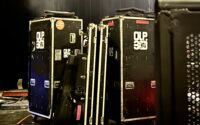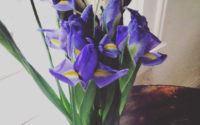The Low Notes
In the range of sounds, I far prefer the low notes. Drop an octave from middle C and something about that majestic resonance pangs in the middle of my chest, where the vagus nerve sits. I feel something soften and suddenly I can breathe easier. It’s no wonder that over the course of my listening history, I’ve gravitated toward the cello, the French horn, the piano. Their timbres feel like home.
I mention these types of sounds because they’ve been especially helpful of late. I was recently diagnosed with dysautonomia as a result of COVID. My autonomic nervous system, which is responsible for the background business of living (heart rate, blood pressure, etc.), isn’t functioning properly, likely because the virus stunned it in some way. Part of the multifaceted problem is that my body produces a larger stress response than a situation might require, and my parasympathetic nervous system (the nerves that relax you) doesn’t activate to calm things down. It’s been disorienting—and debilitating—to say the least.
In addition to the lifestyle modifications I now have to follow, I’ve been focused on soothing my nervous system. Dysautonomia, in some ways, means your body doesn’t respond to stress appropriately and you need to help it recalibrate. You need to remind it how tranquility feels.
I already listened to music a good deal of the time prior to this development, but I’ve been purposely putting on records in the evening and letting the sounds wash over me. And that’s where I’ve been gravitating, once again, to low-end frequencies. Even though there are other more direct examples from Beck‘s 2014 album Morning Phase, “Turn Away” specifically sparked the discovery that such songs actually feel more soothing than anything else.
The track begins with plucked guitar before Beck’s alto layers in. “Turn, turn away/ From the sound of your own voice/ Calling no one, just a silence,” he sings softly. Faint harmonies in the background work into a higher frequency, contrasting Beck’s solemn delivery and the juxtaposition thrums somewhere in body. It feels so damn good. I turn inward and imagine docks stretching out into gray-blue lakes, as though I were back at my beloved Lake Nipissing and the earth turned with me rather than against me.
J. Tillman’s (Father John Misty) early solo albums, too, have been wonderful, especially 2009’s Year in the Kingdom. While the LP doesn’t nestle into low notes exclusively, Tillman’s exquisite alto—here hushed and resplendent—does the trick. The song begins with steel-like sounds and fluttering recorders mimicking the winds that trace their way through the track.
Amid that mild cacophony, a guitar begins strumming and grounds the experiment, before a hammered dulcimer picks up the central melody and thickens the weave. “We’ll find each other where we promised,” Tillman sings ever so quietly. I used to imagine a person as part of that statement, but now it feels closer to my future—once so clear on the horizon and lately grown unsure. I will find it again. I will.
Year in the Kingdom is such a precious gem of an album—a tempered meditation on faith and mortality—and over the years I’ve returned to it when I needed a reminder about something bigger than the present moment. On many of the tracks, Tillman uses hammered dulcimer either as a flourish or a guiding light, and the way it plays against and around his voice makes for an invitation to stop doing so much and just be.
I don’t quite know what’s to come of this recent turn. It may last a few months or it may last a lifetime. In the meantime, I sit and wait—and listen.




